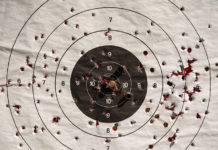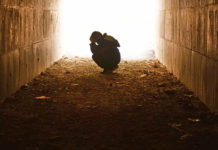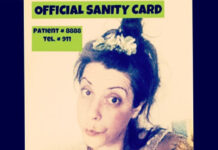My Daughter’s Story
I am now haunted by guilt that my daughter never really had a chance for anything like a normal life, because of the choices that were made for her. Choices made with the 'best' medical advice of the day, which I had never quite accepted as correct, but in the end largely complied with for lack of any clear alternative.
Us, Too: Sexual Violence Against People Labeled Mentally Ill
In light of the recent events and media discussions pertaining to the issue of sexual violence, we feel that it is of the utmost importance to speak out about this issue in the context of psychiatry and the treatment of those perceived as mentally ill.
Disinhibited
The party would continue for a time, but an inevitable crash ensued. I left my family, was fired from my job for uncontrollably screaming at my boss, and gambled away whatever money I had left in the stock market. A debilitating depression soon began, of a magnitude I could not previously have imagined. I had lost everyone and everything in my life.
Admission: A Story of Solidarity and Survival
I survived not because I received excellent care from the staff on the ward. On the contrary, the treatment was objectifying and cold. It’s not surprising that many end up in suicide behind locked doors. I survived because I felt, however fleetingly, my experiences mirrored by others.
A Story of Forced Hospitalization From a Legal Perspective
If I had any legal rights, I knew nothing about them. And the hospital cared even less about them. As a law student, I would like to share the legal rights I did have in the state of California and how they were violated from the very start.
The “Shotgun Method” – A Story of Mental Health Crisis in Iceland
"Let's try the shotgun method," my psychiatrist said — meaning that you load the gun with a bunch of pellets and hope that one of them hits the target. I went through 16 different psychiatric medications in five years, and they were not the right choice for me.
Abduction
The following are some excerpts from my journal about my inpatient experience. Please know that the people in that hospital often reached out to one another in beautiful ways, but overall felt frustrated and stressed due to an oppressive and sterile environment with little positive reinforcement.
Waking Up is Hard to Do
Finally I’m moving in the right direction, rescuing myself from the pernicious grip of psychotropic drugs. It’s been exceptionally challenging, dealing with the adverse physiological reactions my body’s been going through. Waking up may be the toughest thing to do. Ultimately, the way I see it, it’s the only thing to do.
Little Porcupine Goes to the Psych Ward
I was so anxious about having to raise three boys alone that I felt I was going insane. So I thought of going to see a psychiatrist. I was looking for Carl Jung. Instead I found a system where they give you pills, whether you need them or not.
What Does it Mean to be Anti-Psychiatry? Thoughts of a Cartoon Anteater
How did I get here? What turned me from loyal acolyte into fearsome-clawed rebel, itching to take on the high priests of psychiatry? Well, there is nothing like being given a taste of psychiatry’s vile medicine for igniting the revolutionary furnace and getting it glowing white hot.
A System Built on Fear
Experiences such as pain, turmoil, trauma and grief aren’t separate from the person—they shape how that person sees the world, how they cope with the world. To separate those experiences from the person, to call them sick, feels barbaric. It feels as if humans are being taught to fear being human.
“Maybe You Need Meds”: From Passive Patient to Finding My Voice
I made journaling non-negotiable. I started sitting in nature and running trails. I practiced being present and prioritized sleep. These things are often seen as what you do if your problems aren’t really that bad. But to me, these are the things I do to save myself every day.
Schizophrenia Deconstructed
After a few weeks it became clear to me the complete lack of comprehension that I faced as a person claiming to have been cured of psychosis. Being a schizophrenic claiming to no longer suffer from schizophrenia only made me seem more schizophrenic due to the current culture of psychiatry.
The Political Abuse of Psychiatry in America – My Story
Imagine going to the airport to travel to London, only to find yourself locked in a high-security psychiatric ward a few hours later, paralyzed by psychoactive drugs and deprived of all your belongings. This happened to me, and you will be shocked to learn how easily it could happen to you.
Behind Every Label
In my case, an uninformed diagnosis resulted in a near lifetime of mistreatment and misunderstanding. How does one account for such a significant error? Having my diagnosis changed has felt very liberating, but it hasn’t much reduced the effect of the stigma I’ve internalized.
I Am Not the Next Headline in Tragedy
I may be psychotic but I am not the next headline in the news. I am thoughtful and questioning. I am different and unique, but I am not violent and my life will never be anyone's tragedy.
Would you like to stand with me?
Informed Consent for Benzodiazepines: A Personal Account
I began to have transient moments where I would feel oddly disconnected from my environment or wake up and feel like I was coming out of my skin. I did not know it at the time, but I was experiencing interdose benzodiazepine withdrawal and it would end up leading me down a path of polypharmacy.
The Poison Isn’t the Medicine: Antipsychotics, Mania and Sleep
To test the theory that a lack of sleep would trigger mania and resumption of sleep would restore health, I conducted what I thought would be a straightforward experiment: while still on lithium and a low dose of antipsychotics, I suppressed sleep for a few days.
The Best Medicine
Today I am not only medication-free but also thriving. While many people in my life are delighted by my transformation, most did not think it possible. How did I transition from being a chronic, "seriously mentally ill" psychiatric patient to a vibrant being?
Eternal Sorrow: My Unexpected Descent into the Mental Health System
In searching for answers as to what went wrong with my treatment, my family and I discovered that there is already much scientific evidence demonstrating the dangers of antipsychotic medications and why they should not be used to treat illnesses such as Tourette Syndrome.
Take a Flyer Off a Wall: Six Hours in the Hole
Once your body enters a police car or an ambulance, it doesn’t matter what labels you carry or what the apparent “symptoms” are. It doesn’t matter if you even have any label at all. The moment you acquire a mental illness is when someone who doesn’t like you decides that you have one.
How Big Pharma and the Medical Doctors Killed my Father
When the nurses tried to give him other medications, my father refused. They accused him of being “combative” and “uncooperative,” and they injected him with the highly toxic, incredibly dangerous, mind-bending antipsychotic HALDOL.
Southern Vapors: A Comeback Story Not Born of Chemistry
Imagine my excitement, the hope that relief from the sucking tar of misery that dogged too many of my days was within my reach. From that moment and for thirty years to follow, I was the willing guinea pig for any number of drugs. Nothing helped for long.
The Outing of a Consumer
The problem with being a consumer is that we get consumed. I’ve been the bacon at far too many mental health picnics. Someone’s salary gets paid, someone’s program gets funded, someone’s career gets enhanced, someone gets accolades for being so altruistic and such a great savior — and me, what do I get? Exposed, laid bare, and isolated.
Surviving and Thriving After a Diagnosis of Schizophrenia
I have wanted to go public with my story ever since I started getting so dramatically better via holistic means, but I consistently chickened out. It wasn’t until I hopped on a plane to Boston to meet other psychiatric survivors at the Mad in America Film Festival in 2014 that I found the community and forum to do so.

































